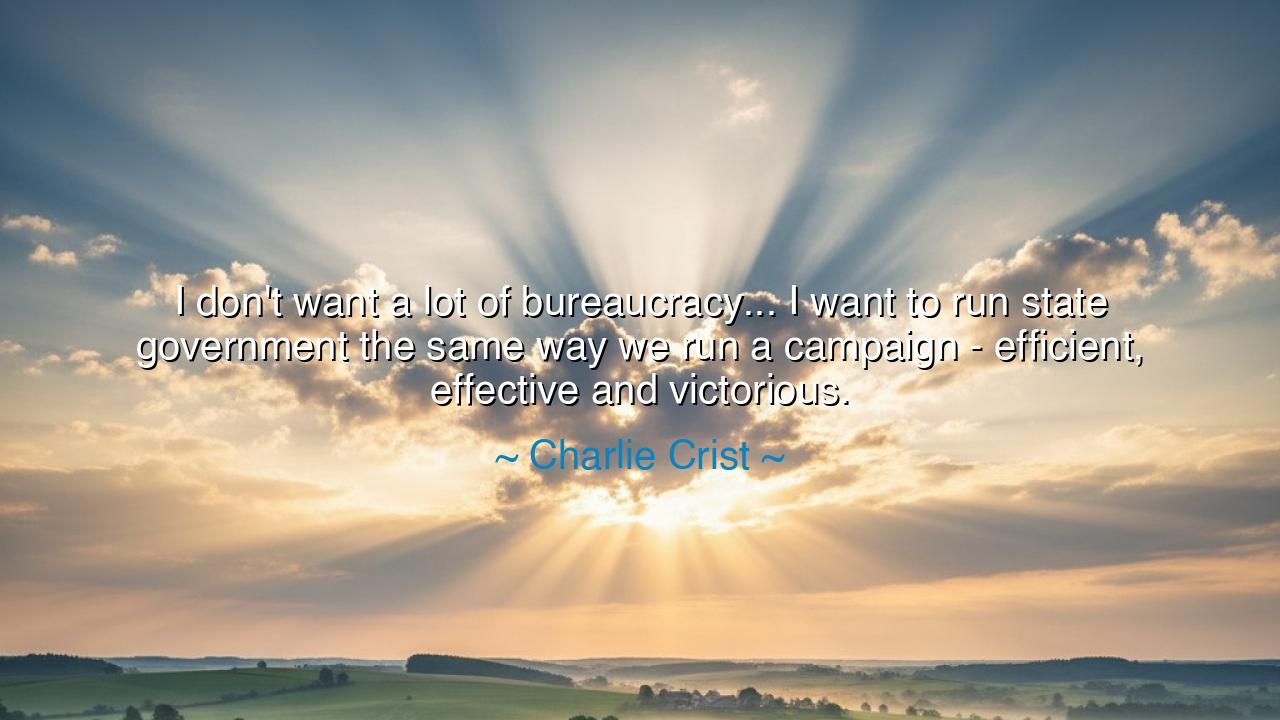
I don't want a lot of bureaucracy... I want to run state
I don't want a lot of bureaucracy... I want to run state government the same way we run a campaign - efficient, effective and victorious.






In a tone of vigor and conviction, Charlie Crist, the American statesman and former governor of Florida, once proclaimed: “I don’t want a lot of bureaucracy... I want to run state government the same way we run a campaign—efficient, effective, and victorious.” These words, though spoken in the modern tongue of politics, resound with the timeless yearning of every age: the desire to strip away the weight of corruption, delay, and waste, and to restore governance to its purest form—swift in action, focused in purpose, and guided by the will of the people. In this statement lies not only a call for efficiency, but a vision of leadership rooted in clarity, courage, and the relentless pursuit of results.
To understand the meaning of this quote, one must first grasp what Crist denounces in the word “bureaucracy.” Bureaucracy, though born from the need for order, too often grows into a labyrinth of forms, rules, and procedures that choke the spirit of progress. It replaces passion with protocol, innovation with hesitation. To Crist, the state must not become a sluggish beast bound by red tape—it must be a living, breathing force for the common good. In his call to govern like a campaign, he speaks of rekindling the energy, urgency, and unity that drive people when they fight for something greater than themselves. For in a campaign, every moment counts, every person matters, and every effort has purpose.
The origin of Crist’s words lies in his own experience as both a campaigner and a governor. Having risen through the ranks of Florida politics, he understood that the fire of democracy is kindled not in offices or regulations, but in the hearts of the people who believe in change. His campaigns were known for their energy and accessibility—qualities he sought to carry into the machinery of governance. To him, government should not be distant or detached, but engaged and responsive, much like a campaign that listens, adapts, and acts. His call was not for reckless speed, but for purposeful motion—for a government that moves with the same focus and determination as those who fight to lead it.
History offers many examples of leaders who sought to free their nations from the strangling grip of bureaucracy. Consider the Roman general Julius Caesar, who, upon becoming consul, found his city paralyzed by endless debate and delay. He cut through the tangle of indecision, reforming the Senate and simplifying laws so that Rome could act with strength and unity once more. Or look to Abraham Lincoln, who during the dark years of the Civil War bypassed endless committees to issue the Emancipation Proclamation, transforming the moral landscape of America. These figures understood, as Crist did, that leadership requires not only wisdom but decisiveness—the ability to act with conviction when the time demands it.
Yet Crist’s vision also carries a deeper truth: that the spirit of a campaign embodies not only efficiency, but connection. A campaign is built on belief—on the trust between leader and people, on the shared hope that tomorrow can be better than today. When government becomes too distant, when its servants forget the faces behind the policies, it loses its soul. By invoking the energy of a campaign, Crist reminds us that governance is not merely administration—it is a living dialogue between leaders and citizens, bound by purpose and accountability. A government that serves like a campaign does not sit idle behind desks; it walks among the people, hears their voices, and answers with action.
But there is also a warning hidden within his words. Efficiency without compassion becomes cruelty; effectiveness without reflection becomes tyranny. The victory Crist speaks of is not conquest or domination, but the triumph of service—when government fulfills its promise to uplift, protect, and empower its people. A campaign’s success lies not in winning power, but in keeping faith with those who granted it. And so, the true measure of an efficient and effective government is not how quickly it acts, but how justly it acts; not how lean it becomes, but how deeply it serves.
Thus, my children of democracy, learn from this teaching: do not allow your institutions to become idle monuments of formality. Demand from your leaders the spirit of action and the humility of service. Let your governments be efficient, yes—but never soulless. Let them be effective, but always guided by moral purpose. And when you lead, whether in office, in business, or in life, lead as one who fights a noble campaign—with vision, discipline, and hope. For the greatest victory is not in defeating others, but in conquering inertia, restoring trust, and proving that leadership, when born of conviction, can still transform the world.
And so remember the words of Charlie Crist: a government should not crawl through corridors of confusion, but march with clarity and purpose. For when leaders cast aside the weight of bureaucracy and embrace the spirit of a campaign, they breathe life into democracy once more—making it, as it was always meant to be, efficient, effective, and victorious for all.






AAdministratorAdministrator
Welcome, honored guests. Please leave a comment, we will respond soon